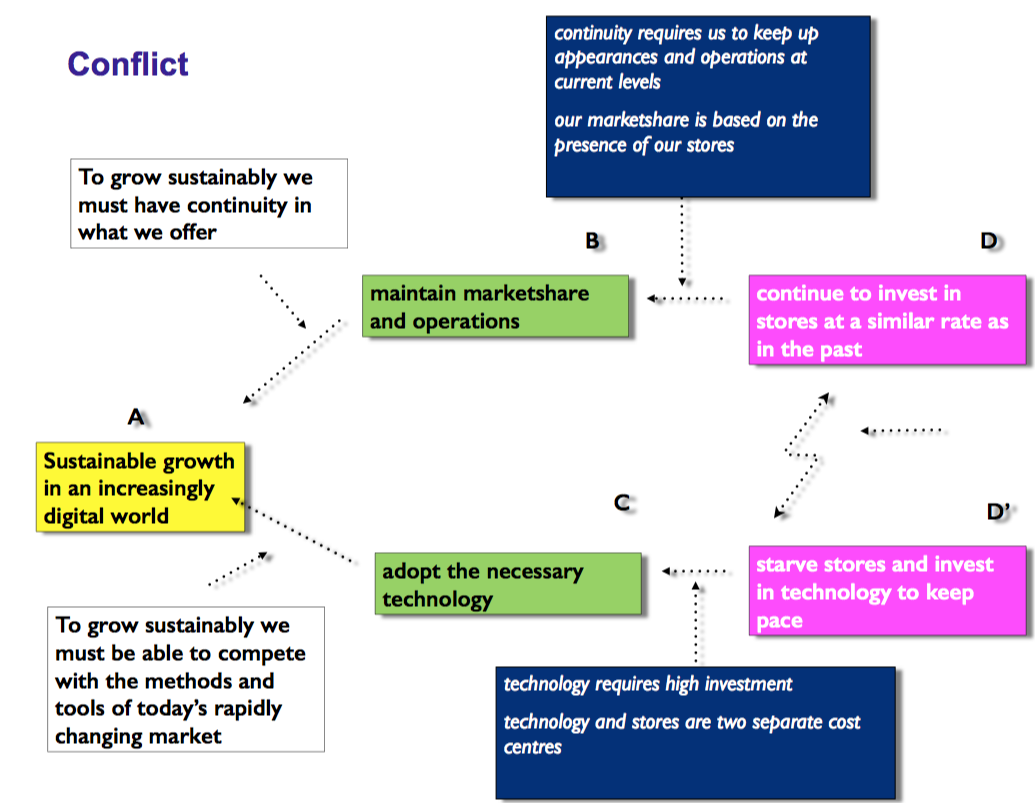
The speed of the change that digitization is bringing is dizzying. It is forcing companies to think hard about the very meaning of the way they do business. Old models are no longer valid and businesses need to catch up fast or lose market share and opportunities. Consolidated experience that had a high value suddenly becomes obsolete. Executive heads are rolling as results fail to be achieved.
A major problem that people face with digitization is THINKING, UNDERSTANDING and DESIGNING ACTIONS for a new reality. The speed of the changes in markets requires an ability to rethink hard, deep and fast to innovate what we bring to the market. If Business Schools were churning out graduates able to do this whenever needed, then companies could at least keep up, but that does not appear to be the case. Business Schools themselves are stuck in mental models and behaviors that have served them well in the past but that are not responding to immediate needs.
An example that affects us all: retail
As retail giant Sears heads for Chapter 11, let’s look at an example that affects us all. How do we shop? What is digitization doing to stores and how should retailers adapt their behaviors? Large chains are replacing top managers because they have not been able to react fast enough to keep up. It’s hardly surprising as retail has worked successfully for so long with traditional solutions. In order to compete and thrive in today’s reality, what they need to be able to do is systematically surface and challenge the ingrained mental models they have about their own business. This is the only way to move forward to finding a breakthrough solution. In this post we use the reliable pattern of the Conflict Cloud, one of the Thinking Processes from the Theory of Constraints to help us think about how to get to that solution.
Let’s take a look at the dilemma many retailers find themselves in. On the one hand, they want to be able to continue to invest in physical stores at a similar rate as in the past. This is because they want to protect a precise need: maintain marketshare and operations. On the other hand, they feel they have to starve stores to invest in technology to keep pace. This is to protect the need to adopt the necessary technology.
The goal that is common to the two legitimate needs is: “Sustainable growth in an increasingly digital world”.
Now let’s look at the assumptions that keep those needs and positions in place:
IF the goal is Sustainable growth in an increasingly digital world and (assumption) “to grow sustainably we must have continuity in what we offer” THEN (need) we must maintain marketshare and operations. AND IF (assumptions) continuity requires us to keep up appearances and operations at current levels AND our marketshare is based on the presence of our stores THEN we want to continue to invest in stores at a similar rate as in the past.
On the other hand,
IF the goal is Sustainable growth in an increasingly digital world and (assumption) “to grow sustainably we must be able to compete with the methods and tools of today’s rapidly changing market” THEN (need) we must adopt the necessary technology. AND IF (assumptions) technology requires high investment AND technology and stores are two separate cost centres THEN we want to starve stores to invest in technology to keep pace.
This is how we place all those “categories of speech” into the conflict cloud diagram:
How can we find a breakthrough solution to the situation of blockage?
How can we move forward out of this conflict and situation of blockage? By looking at the assumptions, or “mental models” that keep us stuck there and invalidating them one by one. We have identified some of the assumptions that retailers are making and that lie beneath the conflict we have described:
- Stores are what we do (our core business is selling from a physical store)
- we know what a store is (our mental models based on experience are consistent and correct)
- technology is an “add on”
- technology and stores are incompatible
- digital is a choice not a necessity
- investing in technology has no positive impact on stores
- investing in technology drains money from stores
- high inventory is what stores require for success
- customers receive better service from stores
- online delivery of goods is slower than from a store
A breakthrough solution to the conflict can be found by addressing each of these assumptions in a way that invalidates them but that protects the two legitimate needs that have been identified. We have some ideas about that.
The future success of any sector lies in the ability of its people to systematically look at their mental models and challenge them. These days many time-honoured patterns for success are becoming quickly obsolete. The clock is ticking.
Intelligent Management, founded by Dr. Domenico Lepore, helps leaders in organizations to speed up flow, overcome silos, and shift towards a systemic way of working based on win-win collaboration and transparency. We are trusted advisors to leaders of organizations through our unique, whole system Network of Projects organization design. Sign up to our blog here. Intelligent Management provides education and training internationally on systemic management using the Decalogue methodology .
See our new books The Human Constraint – a business novel that has sold in 28 countries so far and ‘Quality, Involvement, Flow: The Systemic Organization’ from CRC Press, New York, by Dr. Domenico Lepore, Dr. Angela Montgomery and Dr. Giovanni Siepe.






Leave a Reply